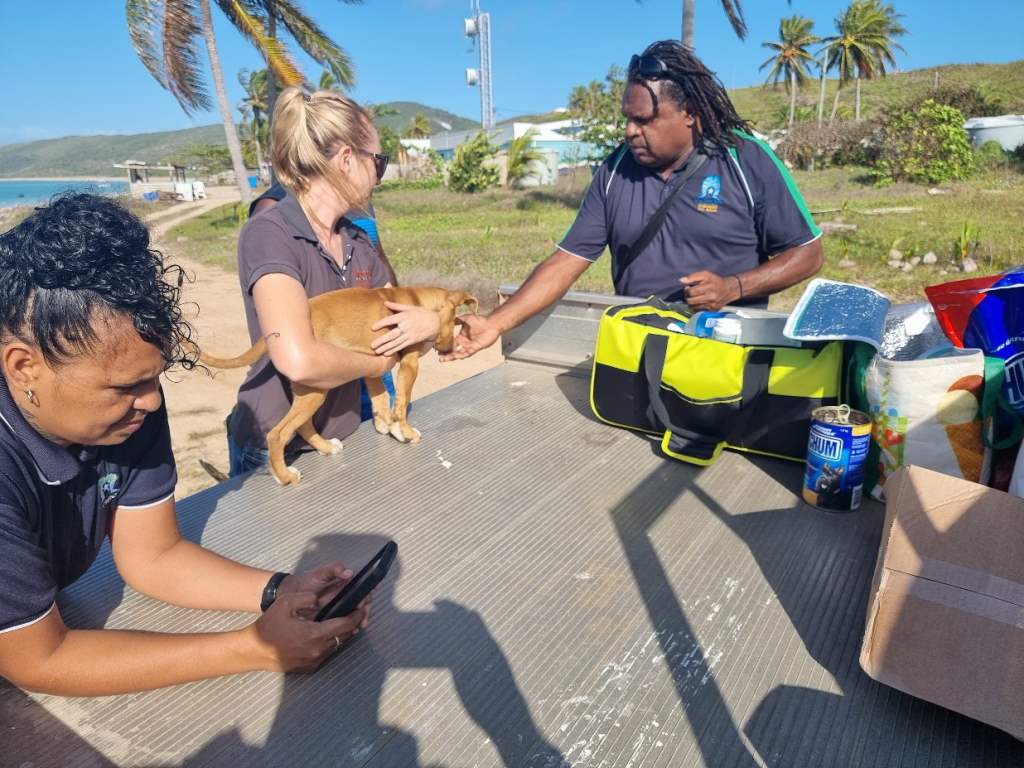AMRRIC has kicked off its second year of the Biosecurity Pilot Project: Improving remote Indigenous community animal health surveillance and preparedness through collaboration with a trip to the outer islands of the Torres Strait to monitor for exotic animal diseases in collaboration with the Torres Strait Islands Regional Council (TSIRC). Before the year moves into full swing, however, a wrap-up of the project’s first year of activities, achievements, and learnings is due…
In late 2021, AMRRIC received funding through the Australian Government Department of Agriculture, Fisheries, and Forestry (DAFF)’s Biosecurity Business Grants program to pilot a new model of biosecurity surveillance for the early detection of exotic animal diseases in companion animals. The 3-year project is rooted in strong partnerships with local organisations and Aboriginal and Torres Strait Islander staff including Environmental Health Workers, Animal Management Workers, and Rangers on the ground in Australia’s frontline of biosecurity, the northern border. Partnering organisations for the project include:
– West Daly Regional Council, NT
– Tiwi Resources, NT
– Napranum Aboriginal Shire Council, QLD
– Torres Strait Islands Regional Council, QLD
– East Kimberley Job Pathways, WA
– Shire of Derby-West Kimberley, WA
Using the AMRRIC App, a custom-built app designed for ease of use to record animals and their health status in remote communities, throughout 2022, AMRRIC and collaborating partners completed 17 animal health censuses in communities across northern Australia. Over 30 Environmental Health Workers, Animal Management Workers, and Rangers were trained to detect, record, and report animal health abnormalities. During the censuses, anti-parasitic treatments were provided to companion animals to treat for ticks, fleas, mites, and worms during the surveillance health checks.

AMRRIC’s QLD Project Officer, Helen Bigmore, working with Torres Strait Islands Regional Council (TSIRC) Environmental Health Workers, Karyche Bowie and David Bosun, on a census for Mabiuag Island to detect, record, respond to and report animal health abnormalities.
Participating staff received training in how to plan and conduct a community animal health census, how to identify signs of common, notifiable, and exotic animal diseases, how to seek informed consent and record animal health data in the AMRRIC App, reporting concerns to veterinarians and biosecurity authorities, and providing anti-parasitic treatments while conducting a general health check of the animals. AMRRIC then provides expert analysis of the companion animal population data, making recommendations to the partnering organisations about how they can best deliver their animal management programs.
Incursions of exotic animal diseases are a major biosecurity concern for Australia. Rabies, for example, is globally widespread (occuring in many countries including nearby Indonesia) and causes an estimated 60,000 human deaths per year worldwide. This project supports the Australian Government NAQS (Northern Australian Quarantine Strategy) and northern communities to keep Australia free of rabies and other exotic companion animal diseases through early detection. Preventing these diseases from establishing is critical for the health of humans, animals, and the environment.
The project is scheduled to continue into 2024 with AMRRIC supporting animal health censuses and active surveillance by delivering training and providing fee-for-service employment arrangements with partner organisations. In the long term, we hope that this model of companion animal biosecurity can demonstrate its value and be adopted across all Northern Australian remote communities.